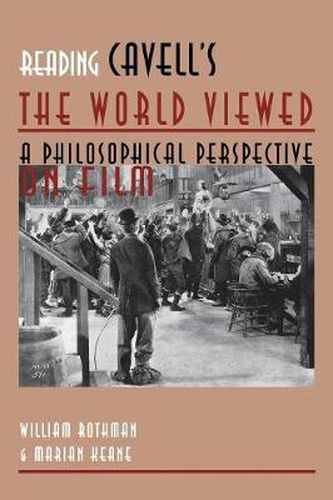Readings Newsletter
Become a Readings Member to make your shopping experience even easier.
Sign in or sign up for free!
You’re not far away from qualifying for FREE standard shipping within Australia
You’ve qualified for FREE standard shipping within Australia
The cart is loading…






This title is printed to order. This book may have been self-published. If so, we cannot guarantee the quality of the content. In the main most books will have gone through the editing process however some may not. We therefore suggest that you be aware of this before ordering this book. If in doubt check either the author or publisher’s details as we are unable to accept any returns unless they are faulty. Please contact us if you have any questions.
In their study of one of Stanley Cavell’s greatest yet most neglected books, William Rothman and Marian Keane address this eminent philosopher’s many readers, from a variety of disciplines, who have neither understood why he has given film so much attention, nor grasped the place of
The World Viewed
within the totality of his writings about film. The authors also reintroduce
The World Viewed
to the field of film studies. When the new field entered universities in the late 1960s, it predicated its legitimacy on the conviction that the medium’s artistic achievements called for serious criticism and on the corollary conviction that no existing field was capable of the criticism film called for. The study of film needed to found itself, intellectually, upon a philosophical investigation of the conditions of the medium and art of film. Such was the challenge
The World Viewed
took upon itself. However, film studies opted to embrace theory as a higher authority than our experiences of movies, divorcing itself from the philosophical perspective of self-reflection apart from which,
The World Viewed
teaches, we cannot know what movies mean, or what they are. Rothman and Keane now argue that the poststructuralist theories that dominated film studies for a quarter of a century no longer compel conviction, Cavell’s brilliant and beautiful book can provide a sense of liberation to a field that has foresaken its original calling. Read in a way that acknowledges its philosophical achievement,
The World Viewed
can show the field a way to move forward by rediscovering its passion for the art of film. The title should be useful to scholars and students of film and philosophy, and to those in other fields, such as literary studies and American studies, who have found Cavell’s work provocative and fruitful.
$9.00 standard shipping within Australia
FREE standard shipping within Australia for orders over $100.00
Express & International shipping calculated at checkout
This title is printed to order. This book may have been self-published. If so, we cannot guarantee the quality of the content. In the main most books will have gone through the editing process however some may not. We therefore suggest that you be aware of this before ordering this book. If in doubt check either the author or publisher’s details as we are unable to accept any returns unless they are faulty. Please contact us if you have any questions.
In their study of one of Stanley Cavell’s greatest yet most neglected books, William Rothman and Marian Keane address this eminent philosopher’s many readers, from a variety of disciplines, who have neither understood why he has given film so much attention, nor grasped the place of
The World Viewed
within the totality of his writings about film. The authors also reintroduce
The World Viewed
to the field of film studies. When the new field entered universities in the late 1960s, it predicated its legitimacy on the conviction that the medium’s artistic achievements called for serious criticism and on the corollary conviction that no existing field was capable of the criticism film called for. The study of film needed to found itself, intellectually, upon a philosophical investigation of the conditions of the medium and art of film. Such was the challenge
The World Viewed
took upon itself. However, film studies opted to embrace theory as a higher authority than our experiences of movies, divorcing itself from the philosophical perspective of self-reflection apart from which,
The World Viewed
teaches, we cannot know what movies mean, or what they are. Rothman and Keane now argue that the poststructuralist theories that dominated film studies for a quarter of a century no longer compel conviction, Cavell’s brilliant and beautiful book can provide a sense of liberation to a field that has foresaken its original calling. Read in a way that acknowledges its philosophical achievement,
The World Viewed
can show the field a way to move forward by rediscovering its passion for the art of film. The title should be useful to scholars and students of film and philosophy, and to those in other fields, such as literary studies and American studies, who have found Cavell’s work provocative and fruitful.